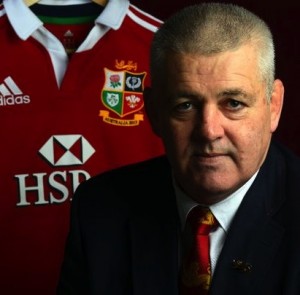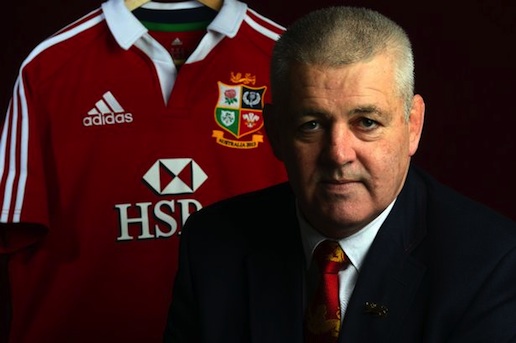 The British and Irish Lions come to Australian with revenge on their minds. Brian O’Driscoll is the only member of the playing squad that saw a 1-0 advantage in 2001 skilfully managed away by good tactics, psychological banter and perhaps a little bit of luck. I am not sure that the Australians have the same legendary players at their disposal, but there is still no certain winner of this series.
The British and Irish Lions come to Australian with revenge on their minds. Brian O’Driscoll is the only member of the playing squad that saw a 1-0 advantage in 2001 skilfully managed away by good tactics, psychological banter and perhaps a little bit of luck. I am not sure that the Australians have the same legendary players at their disposal, but there is still no certain winner of this series.
There are going to be five ways that Warren Gatland’s team will prevail, and I expect not all of them will be revealed by the time even the second test is played.
1. The kicking battle
The Lions have an edge in their kicking game. This is both in goal kicking and out of hand. They have goal kicking range and accuracy and will surely take all the points in offer in the opposition half. Leigh Halfpenny especially will punish any team.
But, crucially, you will find the ball in Australian airspace more than in the Lions half. Sexton (and Farrell) will test whichever back three they face with a variety of kicks. If O’Driscoll plays, then he is very more likely to thread through kicks from positions in the middle of the park.
The Wallabies will be returning kicks from the deep. If they decide to kick back, it is likely that the Lions kicking firepower will win that battle, especially if Rob Kearney plays.
2. The gain line at 12 and 13
There is no secret that Howley (and Gatland) like one pass plays in the back line which get big runners over the gain line. With 100+kg centres and wingers flying through at pace and at angles, it will test even the hardiest of Aussie tacklers.
Isn’t this the way that South Africa plays? Yes, to a certain extent. But it is a little bit more predictable who is getting the ball when the Boks play – de Villiers! A potential Lions line up could see Sexton passing to Roberts, Tuliagi, North or Cuthbert in the same play.
3. Turnover players everywhere

Forget the battle of the flankers, the Lions have got players who capable of making snatch and grab plays from all over the park. In the pack, Gethin Jenkins, Dan Cole, Cian Healy, Richard Hibbard and, the most annoying player of all, Paul O’Connell, pride themselves of their disruptive play at the breakdown.
Multi-phase rugby, so much the preserve of the Australian Super 15 franchises in their pomp, will need more resources at the breakdown, and great support lines to prevent wondering props and hookers reaching in to steal the ball.
4. Okay, the set piece
I waited until I reached the obvious, but it might not be so obvious. Again, with an apparent lack of world class front rowers in the Aussie line-up, it would seem that the Lions will reckon to win the scrum battles.
Actually the key lies in how the referees will look to manage this part of the game. In attack, Aussie scrums will be quick, and away. On defence, the Lions will squeeze and push for penalties – no surprise there.
But I think we will also see the catch and drive at the lineout from deep. All the Lions forwards will be well versed in this ploy. With the Northern Hemisphere weather conditions dictating that throwing the ball around with gay abandon is not always wise, the Lions, with Rowntree as coach, will be keeping the ball close to their chest. This will be as devastating as the scrum.
5. Exhausting the defence
Wales have played a simple game plan in the last few years. Keep playing the same way from rucks, probing from 9, hitting up with forwards and big backs. Eventually the opposition defence will find itself short numbered and then good, large footworkers, like North and Cuthbert, can slice through the gaps.
This is a good plan for a team that has only a short space of time to prepare itself for the series. The relentless nature of this type of attack will tire out teams.
The great unknown will be how the Lions defence will play. Shaun Edwards made some defensive blunders in the last Lions series and Gatland will be keen that defence coach Andy Farrell does not completely reveal their defence ideas in the warm up matches. Farrell comes from a one-tackle one-man background at Saracens where the defence commits one man to the breakdown and fills the field with defenders. With players arriving from different defensive systems at club and country, I suspect Farrell revert to this simplest defence and then try out variations as the tour continues.
Because there is so much debate on who will start at 10 for the Wallabies, and the styles of the Aussie 10s are so different, there has to be more than a defensive plan A. That is a tough call in such a short space of time. Perhaps the criticism placed at the Dean’s door of dithering over style/player is misplaced. The uncertainty might just reveal gaps in a defensive system that is not properly prepared to cope with who starts for the Wallabies.
There is one certainty though – both Gatland and Deans do not enter the arena with their countrymen completely behind them. Not ironically because they are both Kiwis. Instead, because there are so many ways to play the game and there is no consensus. Bar room pundits aplenty love or loathe the selections. Well there are three points of consensus, which apply to Wagga Wagga Under 12s as much as any Super 15 or Heineken Cup finalist team: win your set pieces, make your tackles, kick your goals. The rest will follow.


